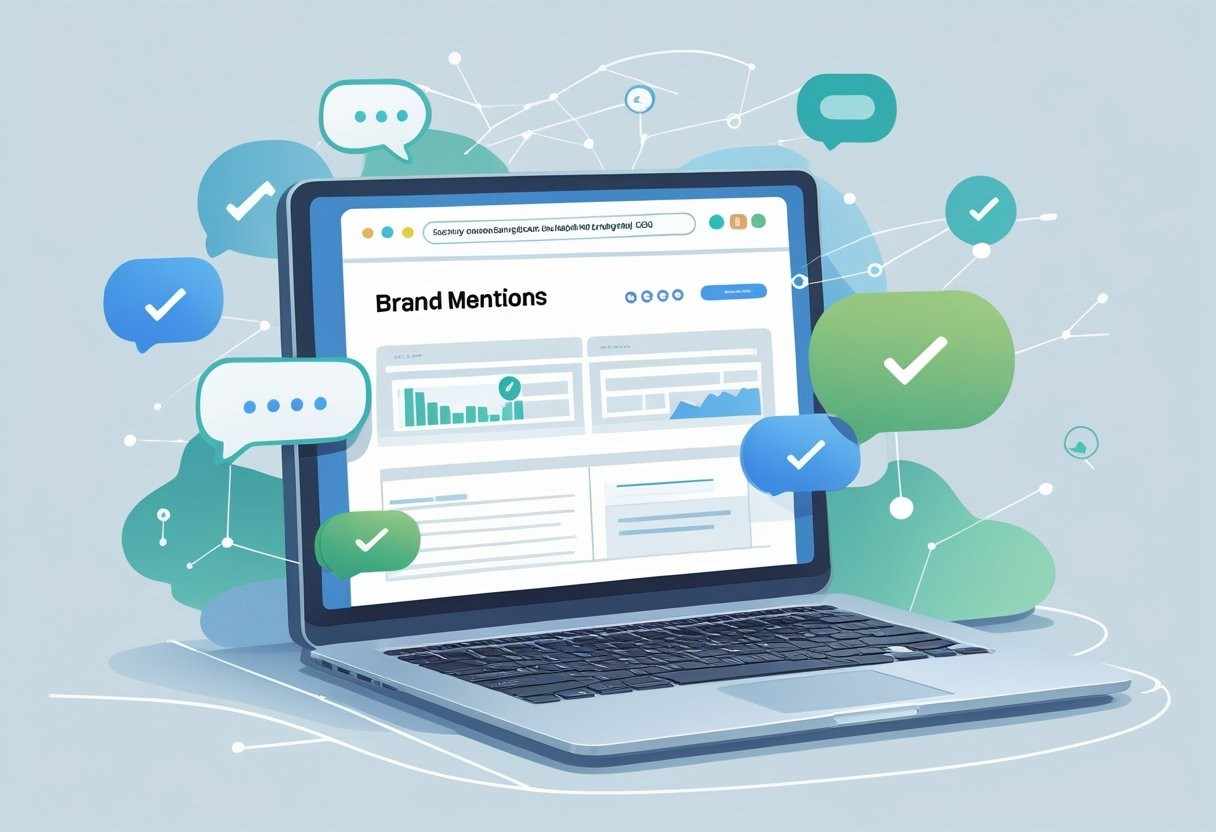
Understanding Brand Mentions in SEO
Think of brand mentions as the digital equivalent of overhearing someone recommend your favorite pizza place at a party. No flashy signs or pushy sales pitches—just genuine conversation that carries weight.
Brand mentions work like quiet whispers that search engines actually listen to. When someone talks about your brand online, whether through linked mentions or unlinked mentions, you're building trust signals that Google notices.
What Are Brand Mentions?
Direct mentions spell out your brand name clearly. Indirect mentions reference your products or slogans without naming you directly.
Both types contribute to your brand authority in ways traditional backlinks can't match.
| Mention Type | Trust Signal Strength | SEO Impact |
|---|---|---|
| Linked mentions | High | Direct ranking boost |
| Unlinked mentions | Medium-High | Implied links value |
| Indirect mentions | Medium | Brand awareness boost |
How Brand Mentions Work for SEO
Google's implied links patent treats unlinked brand mentions as legitimate authority signals. Your brand reputation grows each time someone mentions you without including a clickable link.
Brand mentions serve as subtle trust signals because they feel natural within content. Unlike aggressive ads that interrupt user experience, mentions blend seamlessly into articles, reviews, and social posts.
The beauty lies in their authenticity. When industry experts or happy customers mention your brand organically, it creates genuine credibility that search engines recognize and reward through improved visibility.
Citations: Building Foundational Trust

Citations work like digital breadcrumbs that help search engines verify your business exists and operates legitimately. They're essentially your business's NAP information (Name, Address, Phone) scattered across the web, creating a foundation of trust that Google uses to evaluate your credibility.
Types Of Citations
Structured Citations appear on business directories like Yelp, Yellow Pages, and Google My Business. These platforms have specific fields where you enter your business information in a standardized format.
Think of them as your business's official ID cards scattered across the internet. They're neat, organized, and easy for search engines to read.
Unstructured Citations show up in blog posts, news articles, or social media mentions. Your business information appears naturally within content rather than designated fields.
A local news article mentioning your bakery's address creates an unstructured citation. These feel more organic but can be trickier for search engines to identify and process.
Local Citations focus on geography-specific directories and websites. Chamber of Commerce listings, local newspaper websites, and city business directories fall into this category.
They're particularly powerful for local SEO rankings because they signal to Google that your business has genuine community ties.
Industry-Specific Citations target niche directories related to your business type. Medical practices might appear in healthcare directories, while restaurants show up on dining platforms.
These citations carry extra weight because they demonstrate relevance within your specific field. Google values this targeted credibility when determining search rankings and domain authority.
Actionable Strategies For Day One SEO
Getting started with brand mention SEO doesn't require a PhD in rocket science. You can begin tracking your brand mentions today with some simple tools and strategies.
Setting Up Your Monitoring System
Set up Google Alerts as your first line of defense. It's free and catches basic mentions across the web.
Just plug in your brand name and wait for the magic to happen. Upgrade your monitoring game with professional tools like Semrush or Ahrefs.
These platforms offer deeper insights into where people are talking about your brand. They'll catch mentions that Google Alerts might miss while you're busy making coffee.
Keyword Research and Brand Terms
Create a keyword research list that includes your brand name, product names, and common misspellings. People love creative spelling, so embrace their artistic freedom.
| Day One Task | Tool Needed | Time Required |
|---|---|---|
| Set up alerts | Google Alerts | 10 minutes |
| Track competitors | Semrush/Ahrefs | 30 minutes |
| List brand terms | Spreadsheet | 20 minutes |
| Check social mentions | Native platform search | 15 minutes |
Outreach and Relationship Building
Start your digital PR outreach by identifying websites that already mention your competitors. These sites are prime targets for getting your brand mentioned too.
Monitor sentiment around your brand mentions. Not all attention is good attention, but knowing the difference helps you respond appropriately.
Turn unlinked mentions into backlinks by reaching out to publishers who mentioned your brand without linking. A friendly email often works wonders for your SEO performance.
Remember to track these efforts in a simple spreadsheet. Your future self will thank you when you can see which SEO strategies actually moved the needle.
Frequently Asked Questions
People have tons of questions about brand mentions and how they actually work for SEO. These answers cut through the confusion about whether social media chatter really helps your rankings and what happens when people talk about your brand without linking to you.
Why should I care if people gossip about my brand online?
Think of online brand gossip as the digital equivalent of word-of-mouth marketing, except it's way more powerful. When people mention your brand across the web, search engines like Google pick up on these conversations and use them to figure out if you're worth talking about.
Every time your brand gets mentioned on social media platforms like Facebook, Instagram, or Reddit, it creates a digital footprint. These mentions help build your brand awareness even when they don't include a clickable link back to your site.
The real magic happens when sentiment analysis tools and search engines start connecting the dots. If people are consistently talking about your brand in positive ways across different platforms, it signals to Google that you're relevant and trustworthy in your industry.
Do shoutouts in the digital jungle really help my website climb the Google ladder?
Absolutely, and brand mentions act as digital signals that boost your search engine visibility. When influencers or regular users give you shoutouts without linking, these unlinked mentions still pack SEO value.
Search engines have gotten smarter about understanding context and relevance. They can connect mentions of your brand on Instagram posts, Quora discussions, or even podcasts to your actual business.
The key is volume and consistency. One random mention won't move the needle, but when you're mentioned across multiple platforms regularly, it builds signals of authority that can indirectly boost your rankings.
What's the deal with my brand popping up on blogs? Is it like getting a Hollywood Walk of Fame star for my website?
Blog mentions are actually more valuable than a Hollywood star because they directly impact SEO performance. When bloggers mention your brand without linking, these unlinked brand mentions still contribute to your overall online reputation.
Think of it this way—each blog mention is like a vote of confidence in your brand's expertise. Search engines track these mentions and use them to understand what your brand is known for and whether people trust you.
You don't need to do outreach to get every blog mention. Many happen organically when people genuinely love your products or services and want to share their experiences.
Are hashtags with my brand's name the secret sauce to breaking the internet?
Hashtags with your brand name are like breadcrumbs that help people find you across social media platforms. When users create user-generated content with your branded hashtags, it increases your share of voice in your industry.
Tools like Brand24 and mention.com can track these hashtag mentions and help you understand your brand's social media presence. This data feeds into your overall digital marketing strategy and helps you see where conversations about your brand are happening.
The real power comes when these hashtag mentions spread across different platforms. A hashtag that starts on Instagram might get picked up on Twitter or even make its way into blog posts, creating a ripple effect for your brand visibility.
Can someone talking smack about my brand actually be a win for my SEO game?
This might sound crazy, but negative mentions can actually help your SEO in some ways. Even bad reviews on Yelp or critical comments on social media contribute to your overall mention volume, which search engines notice.
The key is how you handle reputation management. When someone leaves negative feedback, responding professionally shows that you care about customer service.
Sentiment analysis tools help you track the balance between positive and negative mentions. As long as the good outweighs the bad, even some negative chatter can boost your overall visibility and search rankings.
If my brand gets a mention but nobody's around to see it, does it still score SEO points?
Yes, it absolutely does!
Search engines are like digital detectives that crawl the web constantly, finding mentions even in obscure corners of the internet.
A mention in a small forum or niche podcast transcript still gets indexed and counted.
Google alerts and social listening tools can help you discover these hidden mentions.
Sometimes a single mention in a relevant industry blog can be worth more than dozens of mentions in unrelated spaces.